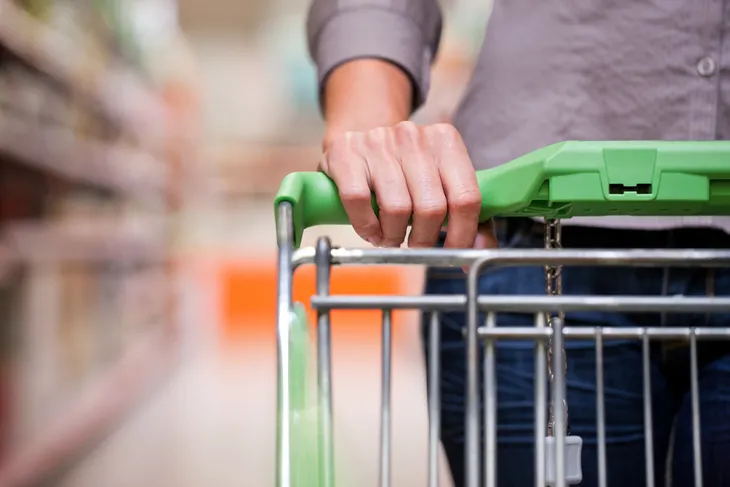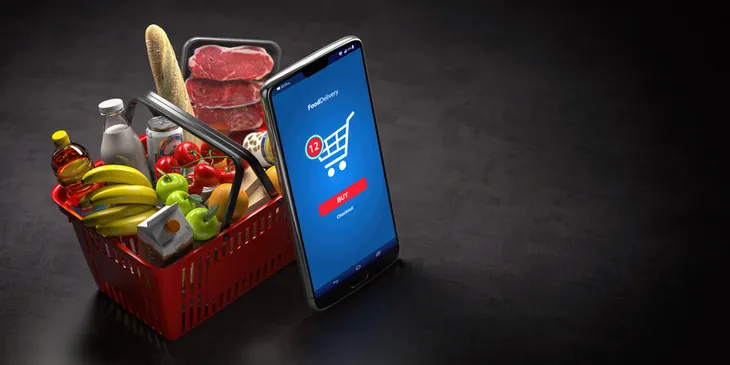- Just like buying other items online, there are pros and cons of shopping online for groceries.
- Buying groceries online can save you time and energy, prevent impulse buying, and help you stick within your budget.
- In some cases, delivery fees can be pricey, you may not always get the items you want, and sometimes there can be hidden markups.
- Just like you would compare items in person for value, you should do the same when weighing grocery delivery services.
It’s no secret that people have been shopping for food necessities more often in recent history. In fact, in 2021, 45-percent of respondents to a survey said they are shopping more often online for things like canned goods, produce, and toiletries than in 2019.
However, just like buying other items online, there are pros and cons of shopping electronically for groceries. For example, you can browse a wide variety of items from the comfort of your own home, but you don’t get to see the fresh produce they’re delivering beforehand. Here are some more things to consider when buying groceries online…
Pro: No Hassle at the Grocery Store
There’s a lot more to grocery shopping than just pushing a cart down several aisles (which can be a hassle in itself if the store is busy). You also have to get in your vehicle to get yourself there, which can mean facing stressful traffic during peak hours or fighting for a decent parking space.
It also means you won’t have to play “reach over people for the item you want” or “which queue is moving quicker” when you’re ready to line up and pay. Delivery of food items can save you a considerable amount of stress, especially at peak in-store shopping times.
Con: Delivery Can Be Pricey
As the Tough Nickel points out, delivery is convenient – and convenience means you’ll shell out more bucks. Because of the increased demand for online grocery delivery, some services have jacked up their prices.
While many delivery services charge a nominal fee to drop groceries off on your doorstep, others have a minimum threshold to qualify for delivery. This could mean you end up buying more groceries than you’ve budgeted for to access the service.
Pro: You’re Less Likely to Impulse Buy
Everyone has gone grocery shopping with a hungry tummy at some point. You can’t always plan your grocery outings with your meals — for example, you might have to swing by the supermarket on the way home from work when your stomach is grumbling for food. In fact, Healthline cites a study that suggests shopping while hungry is not a great idea.
The problem with this is that the items on the shelves start looking a lot more appealing. While you may have a list in your hand, some snack items or other unnecessary purchases might end up in your cart. When you buy online, you’re less likely to impulse buy when something yummy catches your eye.
Con: You Can’t Always Get What You Want
If you read the terms that come with some delivery services, you’ll notice that they reserve the right to substitute if a requested product is unavailable. Or, you may get the product you asked for, but it won’t be the lettuce head you would’ve picked had you shopped in person.
As Food and Wine points out, a computer algorithm might be in charge of deciding what product to give you if the one you want isn’t stocked. It notes that you can reject an item if it’s really not what you wanted. Check your delivery services options — you may be able to turn off substitutions, but you also risk getting no item at all.
Pro: It Saves Time (Usually)
Spend Me Not says that the average grocery shopping trip in the U.S. amounts to 41-minutes. While that might not seem outrageous, that figure doesn’t include the time it takes to get to and from the store whether you’re driving, taking transit, or (gasp!) walking.
The same source also points out that Americans average 1.5 trips per week to the supermarket. Add that up, and it means you’ll be pushing a cart through grocery aisles 53-hours per year, which is more than 2-days. There might be some other ways you want to spend that time, such as getting out in nature.
Con: There Can Be Hidden Mark-Ups
For the most part, the prices in-store will be the same or very close to what you find online. However, an investigation in Canada shows that when online shopping through some grocery chains, that’s not always the case. CBC Marketplace found that in one case, butter that cost $4 in the store cost twice as much when using a particular delivery service.
In fact, the investigation found that shoppers are paying about 10-percent more for items purchased online through certain grocery chains (beyond the stated delivery/service fees). You might also miss out on in-store specials when you shop online.
Pro: Save Your Energy
Daily life can be exhausting, with the demands of work, family, and all the other responsibilities. This makes online grocery delivery more appealing: you won’t have to walk up and down aisles for an hour or lug heavy bags from your vehicle to your front door. Someone else drops them on your porch.
You might have wondered at some point how much exercise you’re getting during a grocery run. FitDay takes some of that guesswork away. It says a 135-pound woman (aged 35) will burn 144-calories per hour shopping for food. The calculator says a 185-pound male the same age will burn 189-calories an hour. If burning calories is your goal, then it isn’t such a bad thing. Or you could try one of these fun calorie-consuming exercises.
Con: It’s Not Always the Best for Perishable Items
Even if you choose online shopping for your groceries, you may still end up needing to go to the grocery store. This is because if you shop online just once a week or bi-weekly, perishable items such as produce and certain meats may not last.
In fact, Forbes said in 2019 that half of consumers buy their perishables online. “Yet even as shoppers buy more groceries online, they still expect the physical stores to be at the ready to meet their needs,” notes the source.
Pro: You Can Stick Within Your Budget More Easily
As the Tough Nickel notes, it’s easier to stick to your shopping list when you shop virtually. You’ll avoid making the aforementioned impulse purchases, which accounted for about 20-percent of grocery bills as of late 2020.
It’s also easier to see how much you’re spending as you add items to your online cart, notes the source. You can also compare brands more easily to see which is the best deal when browsing online, as well as quickly check ingredients and package sizes.
Con: You May Have to Wait for Items
Grocery delivery services are striving to get needed items to people in record time. In fact, at least one service that expanded from Germany to New York City in 2021 promised to have your order at your door in a mind-blowing 10-minutes, according to Grocery Dive. Other delivery services show up with your goods in a matter of hours.
However, as noted earlier, the demand for online groceries has skyrocketed in recent times. That could mean your delivery won’t arrive the same day or even the next day in some cases. If you do grocery shopping only once a week usually, this may not be an issue. However, online shopping is not always faster than picking up items in person when you need something in a hurry.
Be Sure to Shop Around
With more people turning to online grocery shopping, there are more choices out there when it comes to grocery delivery. But just like you would compare items in person for value, you should do the same when weighing grocery delivery services.
USA Today has assembled a handy guide to the most popular grocery delivery services, and what each of them offers. For example, Instacart allows customers to buy a membership to save on deliveries over $35. There are also specialty services such as Imperfect Foods that will save you money on fruits and vegetables “that aren’t perfect specimens.”
So, Is Online Grocery Shopping Better?
This is not a “yes or no” question — it comes down to your needs, your budget, and your lifestyle. If you don’t like being crammed in a grocery store at peak hours, then online orders are the obvious choice. However, keep in mind that you won’t get to handpick your produce and other items as someone else will do that for you.
Also, when it comes to cost, you need to factor in the delivery and service fees, as well as any “hidden” online markups. This could end up being more in the long run than paying for gas and parking to shop in person. Either way, there’s no doubt that virtual grocery shopping is getting more popular, and is here to stay.















